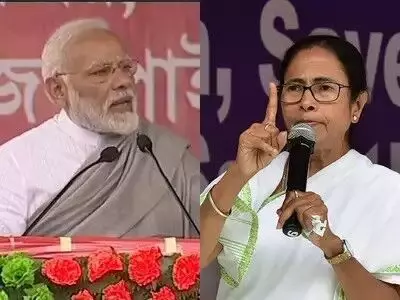
Modi’s Meditation: Cong alleges MCC violation, Mamata questions logic of meditating on camera
text_fieldsThe Congress party lodged a formal complaint with the Election Commission urging action against Prime Minister Narendra Modi's scheduled visit to the Rock Memorial in Kanyakumari from May 30 to June 1.
The backdrop to these objections is Modi’s candidacy in the Varanasi constituency, which is set to vote on June 1.
The Congress argued that the visit, occurring during the 48-hour silence period before the final phase of the Lok Sabha elections on June 1, constitutes indirect campaigning and breaches the Model Code of Conduct (MCC).
Leading the delegation, national spokesperson Abhishek Singhvi, along with other Congress leaders, emphasized the prohibition of any form of campaigning during the mandated silence period.
Singhvi asserted that while there is no objection to personal activities such as meditation, these should not be used as a medium for indirect campaigning, particularly when they could influence voter perception.
The Congress representation to the ECI presented two alternatives: either postpone the Prime Minister’s trip until after the elections on June 1 or enforce a media blackout on any coverage of his activities during this period. The party expressed concerns that media coverage of the PM's meditation could sway public opinion, effectively functioning as a campaign tool.
Meanwhile, West Bengal Chief Minister and Trinamool Congress chief Mamata Banerjee voiced strong objections to Modi’s visit, questioning the necessity and propriety of meditating in front of the camera.
Banerjee argued that such public displays could be construed as attempts to campaign under the guise of religious or spiritual activity. She contended that this not only violates the MCC but also undermines the integrity of the electoral silence period.
The TMC issued a stern warning, stating that any broadcast of Modi’s meditation would be met with immediate action. The party’s statement underscored the need to uphold the MCC and prevent any indirect influence on voters during the crucial final days before the polls.






















